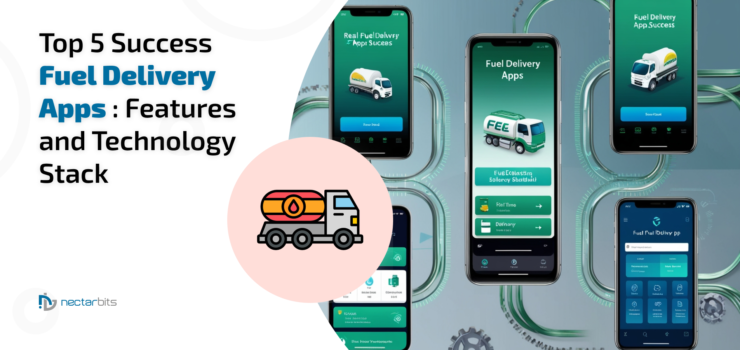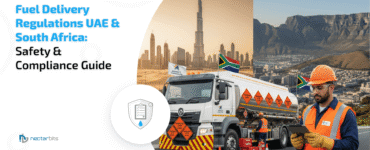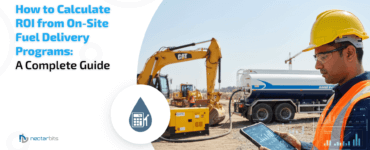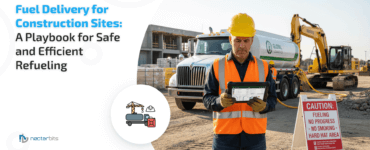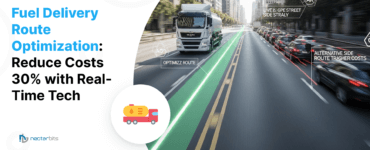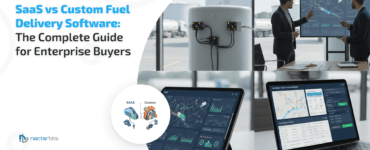Frequent visits to the fuel station and long waits greatly inconvenience individuals, trucking companies, and office buildings. On-demand fuel delivery start-ups perfectly answer this annoyance by delivering fuel anytime, anywhere. In addition to 24/7 fuel deliveries, other services like vehicle repair, maintenance, tank sales, rentals, and inspection services are also offered locally and worldwide. Fuel delivery apps are gaining global traction because of their convenience and accessibility.
It has become the hottest trend across the globe. Increasingly, the new start-ups are trying their hands in the niche industry with a unique range of services.
Top startups in Fuel delivery providers globally: Are Earning Millions With Delivery Services
EzFill: On-Demand Fuel Delivery in the USA

EzFill is an application-based fuel delivery service launched in Miami and serves customers with a split of commercial and individual needs. The application enables users to order fuel on time, so they do not have to make it to the fuel stations in person.
EzFill users only need to download the app, create an account, and order fuel delivery. A fuel truck usually arrives at the agreed-upon time and place to refuel the vehicle. Services available from EzFill also include car washing and check-up services.
EzFill has existed since 2016 and has grown very fast. Due to market and viability factors, the firm obtained $3 million as the initial capital for developing its mobile application and acquiring additional fuel trucks. In 2021, EzFill secured $12 million in a Series B round for its expansion and founding services.
Filld: Gas delivered to your car

Since 2015, the start-up has started offering its services in the Washington and Bay Area with a unique delivery model. The on-demand delivery mobile app has created its distinctive niche with working hours. They deliver fuel overnight between 10 PM and 5 AM. This strategy helps them deliver fuel in reduced time because there is comparatively less traffic at night.
The users are required to download the mobile app and complete the registration by providing their mobile number, and the app asks them daily whether they need fuel. When the user consents, the fuel truck arrives and refills the tanks. The delivery fee is associated with the local average price of the fuel.
The company, which earns nearly $5 million in revenue daily, has raised $28.3 million in funding. Initially, it raised $3.25 million in seed funding in 2015, $9.65 million in Series A funding in 2019, and $15 million in Series B funding in 2020.
Cafu – Petrol & Diesel Delivery in UAE

CAFU is the first fuel delivery start-up to enter the UAE, and it is stepping in with the digitalization trend. The service provider delivers fuel to cars, motorbikes, boats, and fleets, in addition to car inspection and maintenance services.
The company employs on-demand and subscription models to refuel the vehicles’ tanks. Under the on-demand model, users must pay 18 AED for every fill-up service. For a subscription, users pay 26 AED and receive the benefits of unlimited fuel deliveries. The delivery charges were eliminated after the Corona outbreak to encourage people to favor on-demand delivery services.
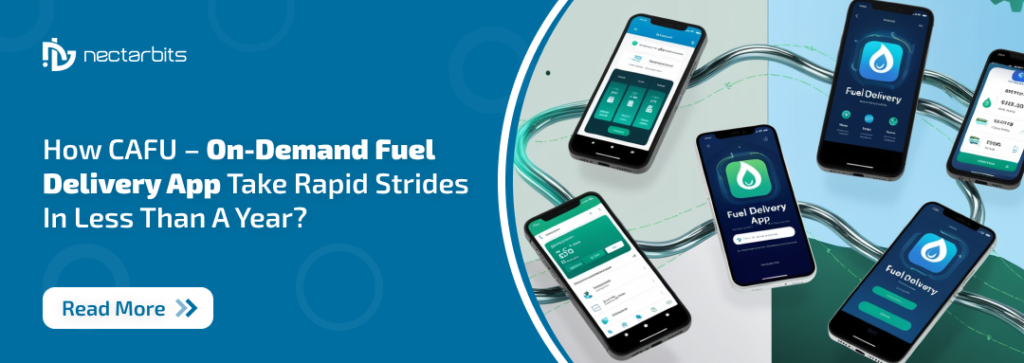
The business, which has 80 custom-built trucks, began its international fuel delivery services in 2018, following multiple funding rounds. Removing delivery charges during the pandemic has helped the business increase its active users to 75% and marginally increase ROI.
Yoshi – Freedom is a Full Tank

The Silicon Valley-based start-up was born to address people’s problems at gas stations. It allows people to book fuel delivery services now or later. For the Yoshi membership fee of $20 per month, users will get unlimited deliveries without paying the delivery fee.
The company takes a big step by providing a bouquet of services, such as 24/7 doorstep fuel delivery and car maintenance services, including oil changes, car washing, wiper blade changes, tire checking, engine cleaners, and more.
The business, founded in 2016, raised $15 million to start the Fuel on Wheels business. Later, the company raised $2.1 million to expand its gas delivery and car wash service. Yoshi raised $23 million in 2020 for on-demand car maintenance services in series B funding.
Maintenance, cleaning, and repair services are also offered when users request them, in addition to car fueling services.
Read More:- Fuel Delivery App Development: Cost Analysis in 2024
Flyers –Gas & Diesel Delivery: Bulk Fuel Delivery Service

The start-up is famous for bulk fuel delivery for businesses across California, Arizona, and Nevada. It aims to meet the fuel requirements of large enterprises, trucking businesses with a fleet of trucks, or independent gas stations with the help of 17 nearby warehouses.
The bobtail trucks were leveraged to deliver fuel for orders between 400 and 14000 gallons. The company boasts of competitive pricing, customer service, and huge daily deliveries (approximately 2 million gallons).
FleetFuelz: National Fuel Delivery – On-Site Fueling Solutions

The company is known for providing a range of products—gasoline, lubricants, diesel, and aviation fuel—to meet the different fuel needs of users. They facilitate on-site deliveries for the construction and mining industries, transportation and fleet vehicles, and wet-hose services for trucks, machines, and generators.
The company has also launched the first fuel card for on-site and on-demand services, which helps businesses get fuel at discounted rates.
Fuel Delivery Apps in Asia and Africa: A Growing Market
Fuel Delivery Market in Asia
As with the convenience that customers demand from services related to refueling, the fuel delivery industry in Asia and Africa has recorded significant growth. In Asia, particularly in India, there is an increase in the number of startups introducing self-solutions in fuel delivery. These startups serve many markets, such as residential subscribers’ markets or markets of commercial buildings and big fleets.
The increasing rate of urbanization and especially the increasing popularity of online and digital payment has boosted the use of such services. MyPetrolPump and FuelBuddy serve major cities where you can order fuel online to be delivered to your doorstep at the right time, avoiding many trips to fuel stations. Incorporating such features as GPS tracking, real-time notification and multiple payment options for a particular ride also makes the application used by many clients thus popular.
MyPetrolPump: Fuel Delivery in India

MyPetrolPump is a new-generation start-up company in Bangalore that delivers fuel to homes, apartments, companies, hospitals, and other commercial establishments. The service has helped cut the many numerations to fuel stations and long queues, especially for companies with many cars.
The consumers then have to download the MyPetrolPump app, register, and place an order indicating the fuel they need. The fuel truck comes to the agreed-upon point and provides petrol to the car.
The current start-up, MyPetrolPump, has been operating since 2016 and has already captured the Indian market. The startup raised $1.6 million in seed funding to spread services to prominent metropolitan areas across India. Besides, the company raised an extra $4.6 million in 2019 to fuel up its operations in its Series A round.
Fuel Delivery Market in Africa
Another emerging, though less developed, market in Africa is fuelling delivery, with emerging fuel-delivery app startups making good progress in places like South Africa and Kenya. These companies provide on-demand fuel delivery services and solve the problems characteristic of the African market, namely, lack of fuel and difficulties with logistics. The concept of mobile applications and lean-integrated start-ups has enabled these start-ups to capture the market base of customers, including end consumers and B2B consumers.
The expansion of fuel delivery applications in Africa has changed fuel availability and has positively impacted the creation of new jobs and increased business performance. Therefore, the markets will grow, and people will integrate fuel delivery services into their everyday lives because of technology and awareness of the services.
Popular Fuel Delivery App Business Models
The successful fuel delivery businesses like- Booster, Filld, Yoshi, CAFU, and Gaston enjoyed incredible success with immense popularity, high users, and huge ROI. However, the business model they inculcated in services and sales propositions made them different and unique. They are:
- Buying fuel from the fuel stations in bulk at a lower cost and zero infrastructure cost allows them to sell the fuel to the users at a comparatively lesser cost.
- Leverage specially designed vehicles that allow them to receive gas directly from suppliers and pump fuel into the users’ cars, cutting out middlemen.
- Facilitating on-demand car wash, oil change, car maintenance services, and fuel delivery.
- Offering fuel delivery subscription plan where the users benefit from unlimited car refueling service.
- Providing the service between 10:00 PM to 5:00 AM results in more deliveries in less time due to comparatively less traffic or no traffic.
- In the B2B model, the fuel delivery business partners with corporates where fuel delivery, car wash, and car maintenance services are offered in office buildings, which results in massive orders and sales.
Fuel Delivery Apps and Enhanced Customer Loyalty
One of the standout advantages of on-demand fuel delivery apps lies in their ability to foster deep customer loyalty. Gone are the days when motorists had to endure long queues, unpredictable wait times, or inconvenient hours just to refuel. By streamlining the process through advanced fuel delivery app development, apps like Filld, Yoshi, and CAFU empower users with what they value most—convenience and reliability.
With features such as easy scheduling, real-time updates, transparent pricing, and doorstep delivery, users feel valued and understood. The seamless experience not only saves precious time but also builds trust, turning one-time customers into regulars. Add-ons like loyalty rewards, referral perks, and responsive customer support further strengthen user ties. In this way, fuel delivery apps aren’t just selling fuel; they’re delivering satisfaction—and making refueling a hassle-free, repeatable habit.
How to Market Your Fuel Delivery App Successfully
While building a robust fuel delivery app is a significant first step, turning it into a household name requires a strategic, ongoing marketing push. Just as companies like Booster and Filld never underestimate the importance of visibility, getting your app in front of the right audience early and often can make all the difference.
Here’s how to kick-start a winning marketing campaign for your fuel delivery service:
- Launch Pre-release Buzz: Begin promoting your app well before the official launch. Use teasers, sneak peeks, and countdowns on social platforms like Instagram, Facebook, and Twitter to engage your target audience. Early sign-up incentives can help build an initial user base eager to try your service.
- Tap Into Digital Communities: Engage with local groups on platforms like Reddit, WhatsApp, and neighborhood forums. Answer questions, share useful tips about car maintenance, and introduce your service with special promotions. This creates both awareness and trust from day one.
- Leverage Influencer & Partnership Marketing: Collaborate with automotive influencers or local bloggers who fit your brand’s voice. Let them experience your service firsthand and share honest reviews. Partnerships with car dealerships or auto service providers work even better when your platform is backed by custom software development services that support integrations and scalability.
- Gather and Act on Feedback: Welcome early adopters by offering beta access or soft launch perks, and encourage them to provide feedback. Use their suggestions to refine your app and showcase these improvements—demonstrating that you listen and adapt quickly.
- Maintain Consistent Visibility: Don’t let up after launch. Invest in targeted ads on Google and Facebook to reach potential users actively searching for fuel or car-related solutions. Keep your app top-of-mind with ongoing digital marketing, email newsletters, and in-app notifications highlighting new services or offers.
A clever mix of these strategies not only builds a loyal user community but also positions your brand as a modern, customer-centered solution in the ever-evolving market.
Identifying the Right Audience for Your Fuel Delivery App
When it comes to building a thriving fuel delivery business—be it in bustling metros like Bangalore or rapidly evolving hubs in Africa—the first order of business is understanding precisely whom you’re serving. Skipping this crucial step is like topping off your tank with the wrong fuel; sooner or later, things grind to a halt.
To carve out your customer base, start by looking at the landscape shaped by pioneers like MyPetrolPump, Booster, and Yoshi. Analyze questions like:
- Are you targeting individual urban commuters seeking convenience?
- Do you see more potential in corporate fleets, logistics operators, or rideshare companies juggling dozens of vehicles?
- Is your ideal user a hospital, school, or gated community where group orders might be the norm?
- What are the pain points—long fuel station queues, lack of nearby stations, or specific delivery windows—that you could uniquely solve?
Creating detailed user personas based on demographic, geographic, and behavioral traits is your fuel map. Talk to prospective users, study competitors’ customer types, and pinpoint what motivates a switch from traditional fueling to doorstep delivery. This understanding ensures your app—and your whole business model—delivers real value, not just a new layer of complexity.
Armed with this clarity, you can tailor features like GPS-enabled delivery tracking, flexible payment options, and subscription or bulk delivery plans that truly resonate with your chosen audience. In short: Know your driver before you build the road.
Reduced Maintenance Costs with Smart Operations
Fuel delivery apps are not only transforming customer convenience but also slashing operational costs for service providers. By eliminating the need for traditional fuel stations—which require substantial investment in physical infrastructure, staffing, and constant upkeep—businesses can operate with a leaner setup.
These apps rely on a fleet of specialized vehicles, such as those used by Booster and Yoshi, to deliver fuel directly to customers. This approach cuts out ongoing expenses associated with utilities, security, and site management. When combined with intelligent features built through enterprise-grade mobile app development, service providers gain tighter control over logistics and operations.
Additionally, advanced logistics features—real-time tracking, route optimization, and streamlined order management—minimize unnecessary mileage and wear-and-tear on vehicles. The result? Lower fuel consumption, reduced routine maintenance costs, and more efficient resource allocation. For new entrants and established players alike, this digital-first model significantly reduces the financial burden traditionally tied to delivering fuel services.
Leading Monetization Model for Fuel Delivery Business
Irrespective of business type and size, every entrepreneur expects constant revenue after planning, investing huge bucks, and spending a lot of time. This is relevant as the cost of developing an on-demand fuel delivery app is a considerable investment for any business. For the new players on the on-demand block, we have enlisted a few ways that successful fuel delivery businesses employ to generate revenue.
- The fuel delivery businesses directly partner with fuel suppliers, who help them obtain fuel at a much lower price. They sell fuel at nearly the price of petrol stations.
- Delivery fee is the primary source of revenue, where expedited deliveries increase the charges, generating extra profit.
- The membership fee, which includes an annual subscription plan for unlimited deliveries, generates huge bucks.
- Partner with nearby fuel stations and allow them to run a mutual business in exchange for a certain amount for providing a digital space on the application.
- With Android And iOS app development, entrepreneurs at the later stage can charge registration fees for doorstep fuel delivery at their fingertips.
- With the B2B model, the business can acquire many services even with trivial marketing investment, as bulk orders generate revenue faster.
Research and Planning Essentials for Fuel Delivery App Development
Before diving into app development, it’s important to lay a solid foundation through thorough research and detailed planning. Start by analyzing your target market—consider demographics, geographic demand, and the unique challenges local users face. Study your competitors to understand what features they offer, how they price services, and where gaps may exist in the current landscape.
Focus your planning on pinpointing the specific needs and pain points of your potential customers. Compile a list of must-have features for your app, such as real-time fuel tracking, multiple payment options, and safety protocols. Don’t forget regulatory considerations, especially environmental and transport regulations particular to your region.
Other keys to successful planning include:
- Defining your value proposition—what sets your solution apart from traditional gas stations or existing fuel delivery apps.
- Establishing clear objectives and milestones for the development process.
- Outlining a user journey, from fuel ordering to completion, to identify potential friction points.
- Collaborating with experienced developers who understand the nuances of building secure, scalable logistics platforms.
- Forecasting budget and timeline to ensure an efficient rollout.
A comprehensive research and planning phase sets the stage for a smoother development cycle, fewer costly missteps, and a product that genuinely meets market needs.
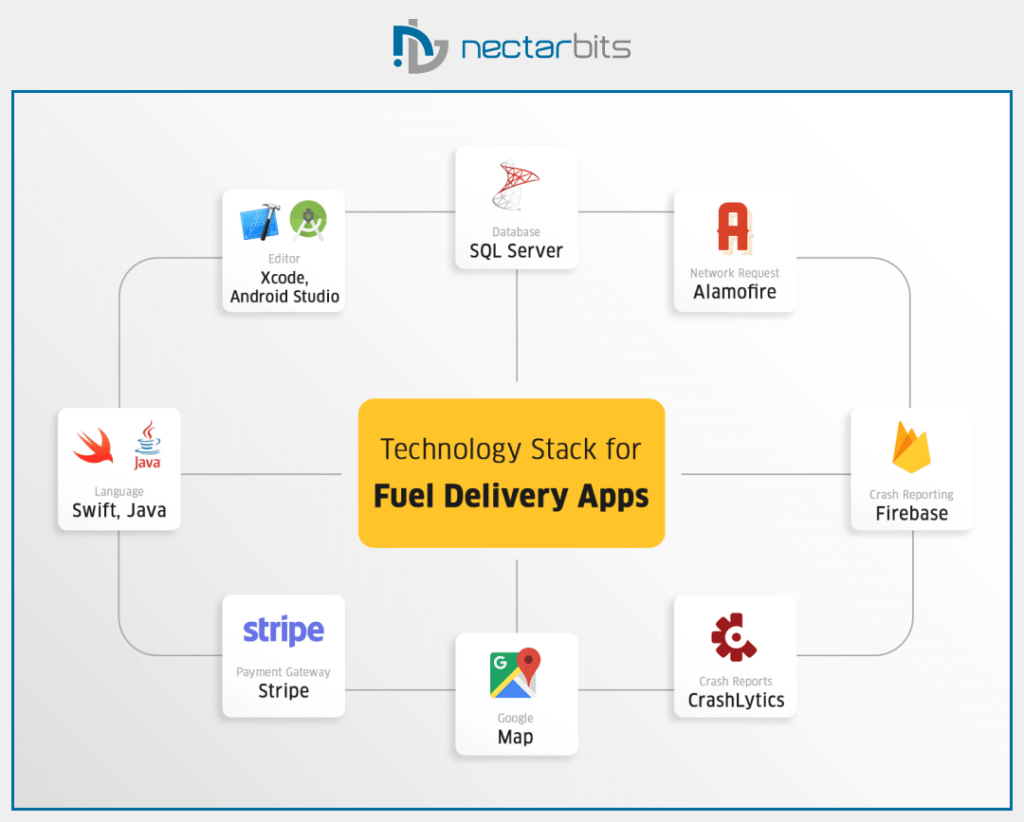
Fuel App Technology Stack
Best Technology Stack for Top Fuel Delivery Apps
Building a successful fuel delivery app—like Booster, Filld, CAFU, or Yoshi—requires the right mix of technologies, tools, and strategies. Choosing the right stack ensures smooth performance, scalability, and security while delivering a seamless user experience. Let’s break down the essential steps and technologies you need to consider.
Steps to Build Your On-Demand Fuel Delivery App
Creating a successful on-demand fuel delivery app calls for a well-mapped journey—one that blends strategic planning, smart technology choices, and customer-centric thinking. If you’ve set your sights on joining the ranks of Booster, Filld, or Yoshi, here’s a practical walk-through to bring your fuel delivery idea to life:
1. Market Research & Business Blueprint
Begin by diving into thorough market research to identify gaps, customer pain points, and emerging trends in your target region. Understand who your competitors are—what makes them tick, and where they’re dropping the ball. Define your service area, customer segments, and the unique value your app will deliver. The clearer your plan, the fewer surprises you’ll encounter down the road.
2. Deciding Your Business Model
Will you aggregate existing fuel suppliers, delivering through third parties, or will you operate your own fleet like Booster and Filld? Your model will influence app features, partnerships, and licensing requirements. Assess what fits your resources and long-term vision best.
3. Pinpointing Your Audience
Every great app starts with a clear understanding of its intended users. Are you targeting time-strapped commuters, corporate fleets, or businesses with hefty fuel demands? Shape your feature list and user experience around these core groups to ensure your solution solves real-world problems.
4. Crafting a Seamless User Experience
A fuel delivery app’s success depends heavily on how effortlessly users can interact with it. That’s where thoughtful UI/UX design comes into play. From the first login to the final fuel drop, every touchpoint should feel intuitive, fast, and reassuring. Partnering with a team experienced in UI/UX design services ensures your app balances clean visuals with practical workflows—like frictionless onboarding, simple fuel selection, clear pricing breakdowns, and real-time order tracking. A well-crafted interface not only improves usability but also builds instant trust, which is critical in a service handling payments and safety-sensitive deliveries.
5. Choosing the Right Technology Stack
Performance, scalability, and security are paramount. Native development can provide the smoothest experience but demands more resources, while cross-platform solutions (like React Native or Flutter) speed up development. Integrate reliable mapping APIs (think Google Maps), GPS tracking, secure payment gateways, and IoT capabilities if you plan to offer smart fuel management features.
6. Building & Launching Your MVP
Once the user experience is mapped out, the next milestone is building a Minimum Viable Product (MVP). Instead of launching with every possible feature, focus on the essentials: fuel ordering, live GPS tracking, secure payments, and basic customer support. Developing your MVP with a proven MVP app development approach allows you to validate your concept quickly, gather real user feedback, and fine-tune features before scaling. This lean strategy reduces development risk, speeds up time-to-market, and ensures you’re building what users actually want—not just what looks good on paper.
7. Rolling Out Strong Marketing
Don’t let your launch be a whisper. Build buzz with targeted pre-launch campaigns—leverage social media, influencer partnerships, and local outreach. Consider referral bonuses, launch discounts, or early-bird memberships to get users hooked from day one.
8. Monitoring & Optimizing
Post-launch, keep an eagle eye on key metrics: daily active users, conversion rates, order volumes, and customer feedback. Use analytics tools to identify bottlenecks and areas for improvement. Advanced features like IoT-based fuel monitoring and analytics dashboards help you stay compliant and efficient, while delighting your users.
By weaving these steps together, you lay a solid foundation for a fuel delivery venture that’s both profitable and sustainable. Now, let’s explore how your app’s front end can stand out in a crowded marketplace.
Front-End Technologies that Aim to Mesmerize
The phenomenal app’s UI and UX make the user repetitively use the same application in a sea of apps of the same genre. The mobile-responsive design includes optimal graphics, so the app’s performance won’t be negatively impacted.
But what truly sets a top-tier fuel delivery app apart is prioritizing customer-centric design at every step. A clean, intuitive interface ensures users can navigate and complete their tasks
quickly—whether it’s booking a fuel delivery, checking order status, or managing subscriptions.
A thoughtful app color palette that aligns with your brand not only enhances visual appeal but also fosters an inviting atmosphere, encouraging users to engage more deeply with your service. Streamlined navigation is essential; every button, menu, and workflow should be designed to remove friction and make the entire experience as seamless as possible.
In other words, the more comfortable and confident your users feel, the more likely they are to return—transforming occasional customers into loyal advocates for your brand.
| Aspect | Details |
| Purpose | Ensures optimal performance, user interface (UI), and user experience (UX). |
| Mobile-Responsive Design | Designed to work flawlessly on various devices, ensuring optimal graphics without impacting performance. |
| Android App Development | Languages Used: Java, Kotlin, Flutter Features: Latest programming languages ensuring high performance and seamless functionality for Android users. |
| iOS App Development | Languages Used: Swift, Objective C Design Themes: iOS Design Themes Web Technologies: HTML5, CSS3, JavaScript (JS), Bootstrap, Angular Features: Enhances utility and convenience in the app. |
Influence of Platform Choice on Fuel Delivery App Development Costs
Your choice of development platform is a pivotal factor in determining how much you’ll invest in bringing your fuel delivery app to life. Here’s why:
- Single Platform (Android or iOS): Building your app for just one platform—say, Android using Kotlin or iOS with Swift—offers a lower entry cost. This focused approach means quicker development cycles and reduced initial expenses, making it a savvy move for startups keen to minimize risk before scaling.
- Cross-Platform or Hybrid Solutions: Opting for cross-platform frameworks like Flutter or React Native allows you to launch on both Android and iOS simultaneously. While these technologies can help you reach a broader audience faster, they often require greater up-front investment in design, testing, and quality assurance to ensure seamless performance across multiple devices.
- Scaling Up: Starting with a single platform provides a valuable opportunity to refine user experience and gather feedback, all while controlling your budget. As your business gains traction, transitioning to additional platforms or a hybrid framework becomes a forward-thinking step in expanding your reach.
In summary, whether you choose to start with a single platform or go cross-platform from the get-go, your decision will directly shape development costs, time-to-market, and your app’s initial audience.
Back-End Technologies that Aim to Perform
The back-end technologies are the backbone of the app, making it perform flawlessly in the real world. They hide the ugly reality of the app and display functionalities to the users in the easiest form to understand.
| Aspect | Details |
| Purpose | Serves as the backbone of the app, ensuring flawless performance and providing functionalities in an easy-to-understand manner. |
| Programming Languages | Scripting Languages: Ruby, Python, Node.JS Features: These languages power the logic and data handling of the application. |
| Cloud-based Back-end Servers | Types: JSON API, REST API, GraphQL, XML APIs Features enable communication between different parts of the app and third-party services, facilitating data exchange and remote procedure calls. |
| Databases | Types: NOSQL, MySql, MongoDB Features: Used for storing and retrieving data efficiently, supporting structured and unstructured data. |
| APIs | Types: JSON API, REST API, GraphQL, XML APIs Features: These enable communication between different parts of the app and third-party services, facilitating data exchange and remote procedure calls. |
Essential Admin Features for Fuel Delivery Apps
Behind every seamless fuel delivery operation lies a robust set of admin features, ensuring everything runs as smoothly as a finely tuned engine. These controls help keep chaos at bay and provide administrators with the tools to steer the ship (or, well, the fleet):
- Secure Admin Access: A dedicated login system ensures only authorized personnel can access critical backend controls.
- Comprehensive Dashboard: Visual management consoles offer real-time oversight of orders, deliveries, and overall operational status.
- Fleet Management: Easy tracking and management of fuel tankers lets admins monitor locations, availability, and maintenance schedules.
- Driver Oversight: From assigning routes to evaluating driver performance, admins can allocate tasks and keep tabs on the team’s efficiency.
- Customer Management: Maintain customer records, handle account inquiries, and provide support—all within one integrated interface.
- Dynamic Fuel Pricing: Quickly update prices or roll out special offers based on market fluctuations or promotions.
- Transaction Tracking: Dive into detailed histories of completed orders, payments received, and commissions distributed to drivers.
- Insightful Reporting: Generate actionable reports covering sales, delivery metrics, and operational bottlenecks to support data-driven decisions.
- Category Management: Organize different fuel types to make inventory easy to manage and supply even easier to track.
- Timely Notifications: Send instant alerts and updates to users and staff alike, ensuring no one misses a beat.
Together, these features deliver precision, control, and clarity—everything administrators need to keep fuel delivery humming along without missing a drop.
Key Factors That Impact the Cost of Fuel Delivery App Development
While choosing the right technologies is essential, understanding what shapes the overall cost of developing your app is just as crucial. A variety of elements come into play, each influencing your final budget in unique ways.
App Complexity and Features
- The scope of your app—ranging from simple order placement to advanced real-time tracking and payment integration—will have a direct impact on the price.
- Each additional functionality may require custom coding and integration, raising the development effort and, subsequently, the cost.
- Streamlining your feature list early on can help control expenses, focusing on core requirements before layering in enhancements.
User Interface and Experience (UI/UX) Design
- Investing in a user-friendly, visually engaging interface is more than cosmetic; it’s vital for attracting and retaining customers.
- Polished navigation, intuitive screens, and interactive elements typically call for design iterations and prototyping before full development.
- More intricate designs and animations generally require more resources, but they can pay off by setting your app apart.
Platform Choices
- Deciding whether your app will debut on iOS, Android, or both (cross-platform) is another major cost consideration.
- Single-platform apps usually require less initial investment, making them a common starting point for new ventures.
- Expanding to additional platforms after launch is possible, though it often means additional work and associated costs.
Ultimately, having a clear vision for your project and making strategic decisions at each step will help you manage your app development budget wisely.
Feature Complexity and Its Impact on Fuel Delivery App Costs
Much like how robust back-end technologies quietly power your app, the features you choose—and just how intricate they are—will shape the final price tag. Complex features, such as real-time GPS tracking, dynamic pricing, or seamless integrations with external payment gateways like Stripe or PayPal, demand more sophisticated logic and often require custom code implementations.
Here’s how feature complexity plays a role:
- Custom Development: Advanced functionality may call for building new modules from scratch, which extends both development time and required expertise.
- Integration Overheads: Features that need to interact with various third-party APIs or external platforms (for example, Google Maps for route optimization), invite additional planning, testing, and maintenance.
- Testing & Quality Assurance: The more complex the feature set, the more rigorous the quality assurance process becomes, ensuring everything runs smoothly without unwanted surprises for the user.
- Scalability Concerns: More advanced features might require a scalable backend configuration, leveraging solutions from providers like AWS or Azure—which can impact infrastructure costs up front.
In short, while basic fuel delivery functionality keeps things cost-effective, each new layer of complexity—whether it’s customer ratings, route suggestion algorithms, or demand forecasting—nudges both the budget and the build timeline upwards.
Third-Party Integrations with Fuel Delivery Apps
The readily available third-party APIs eliminate the need to engineer every functionality from scratch. They are available in the plug-and-play form, so no coding is required from development to integration. Various third-party integrations that are popular in fuel delivery apps are:
- Using social media APIs, you can enable registration or sign-in directly through social channels without entering the credentials every time.
- Users can make payments however they want through multiple gateways, such as Braintree, Authorize.Net, Stripe, and PayPal integration. The payment gateways execute and manage transactions and ensure data security from start to finish.
- GPS integration allows users and drivers to track each other’s locations in real-time to stay up-to-date about the truck’s location and easily arrive at the destination location. Google Maps and Apple Maps integration also help in viewing the location on the map and getting directions for the optimized routes.
- Push.io is a well-known push notification API that allows you to integrate an in-app notification feature that keeps the user easily informed about every progress made in the fuel delivery booking.
- Zoho, Salesforce, and Microsoft Dynamics-like CRMs are leveraged to understand customers better and improve customer relationship management.
- Embrace KISSmetrics, Piwik, Hotjar, and Woopra-like analytics tools to identify all the touchpoints that negatively impact performance or ruin the customer experience.
To further enhance the reliability and usability of your fuel delivery app, consider building a robust foundation that supports both Android and iOS platforms. Integrating IoT smart lock systems can offer secure access to fuel tanks, while comprehensive analytics trackers provide valuable insights into usage patterns and service performance.
Additionally, advanced GPS integration using services like Google Maps not only enables real-time tracking, but also ensures drivers can navigate the most efficient routes. By combining these tools and technologies, your fuel delivery app can deliver a seamless, user-friendly experience that keeps both customers and service providers in sync every step of the way.
How App Complexity Impacts Fuel Delivery App Cost & Timeline
The scope and sophistication of your fuel delivery app play a major role in determining both how much you invest and how long it takes to bring your idea to the finish line. Here’s a quick breakdown of what to expect, based on complexity:
- Basic Apps: These are your starter packs—think essential features like location-tracking, registration, payment processing via gateways like Stripe or PayPal, and standard push notifications. Development costs for a basic solution typically range from $40,000 to $80,000, with timelines running around 3 to 6 months.
- Medium Complexity: Want more bells and whistles? Mid-tier apps layer in advanced features—real-time analytics dashboards powered by tools like Hotjar or KISSmetrics, CRM integrations with Salesforce or Microsoft Dynamics, and enhanced route optimization with Google Maps or Apple Maps APIs. These apps generally require an investment of $80,000 to $125,000 and development periods of 6 to 9 months.
- Complex Solutions: For those aiming for the gold standard—including custom modules, intricate admin panels, multi-role access, advanced analytics, and robust third-party integrations—costs can climb to $125,000 or more and timelines extend beyond 9 months.
Ultimately, features like real-time tracking, seamless third-party integrations, and user-friendly interfaces not only define the user experience but also shape your budget and launch schedule. Choosing the right starting point depends on your goals, audience size, and appetite for innovation.
What Are the Typical Costs of Developing a Fuel Delivery App?
Let’s talk numbers—because let’s face it, even the slickest fuel delivery app won’t build itself for free (unless an army of caffeine-fueled developers suddenly decide to work pro bono, which, as of now, remains a technological unicorn).
The cost to develop a fuel delivery app can swing quite a bit, mainly depending on how feature-packed and sophisticated you want it to be. The simplest version—think a bare-bones app with basic booking, GPS location tracking, and payment integration—typically falls between $40,000 and $80,000 and can take three to six months to roll out.
If you’re dreaming bigger, with custom dashboards, push notifications, advanced analytics, and thorough CRM and payment integrations (hello, Stripe, PayPal, and Google Maps!), your budget needs to be a bit roomier. Building a medium-complexity app will likely run you $80,000 to $125,000, with a timeline stretching up to nine months.
For the grandmasters of digital delivery—the full-blown, enterprise-grade solutions packed with cutting-edge features, advanced route optimization, real-time notifications, multifaceted user roles, security protocols, and analytics so deep you’ll need a snorkel—costs can reach $200,000 or more, and development can extend beyond nine months.
Here’s a quick breakdown for your convenience:
| Complexity Level | Estimated Cost | Estimated Timeline |
| Basic | $40,000–$80,000 | 3–6 months |
| Medium | $80,000–$125,000 | 6–9 months |
| Complex | $125,000–$200,000+ | 9+ months |
What Factors Affect the Final App Price?
A few key items will influence where your project lands on this cost spectrum:
- Feature set: GPS tracking, multiple payment gateways (Braintree, Stripe, PayPal), real-time notifications, analytics integrations (KISSmetrics, Hotjar).
- Platform choice: Android, iOS, or both.
- UI/UX sophistication: Custom themes and seamless navigation will add to the price.
- Back-end complexity: Connecting with multiple third-party systems, handling large data volumes, or providing real-time updates.
- Testing and security: App stability, encryption, and rigorous quality assurance add to cost and are absolutely worth every penny.
Understanding these variables up front can help you chart a more predictable course for your app development journey.
How Fuel Delivery Apps Guarantee High-Quality Fuel
Ensuring the quality of fuel delivered right to your doorstep is a top priority for leading fuel delivery apps. Unlike traditional gas stations—where fuel may linger in underground tanks for extended periods—these services often provide fresher fuel sourced from regularly replenished depots.
Here’s how fuel delivery apps uphold high standards for every drop that reaches your tank:
- Consistent Filtration and Testing: Modern fuel delivery services employ advanced filtration systems and conduct rigorous quality checks before dispatching fuel. This guarantees that contaminants and sediments don’t make their way into your vehicle.
- Optimized Logistics: Drawing inspiration from food delivery and grocery logistics, companies use dynamic routing and real-time tracking (powered by providers like Google Maps) to streamline delivery. Quicker routes mean less time for fuel to degrade, ensuring what you receive is as fresh as possible.
- Regulated Storage and Clean Transit: Delivery vehicles are equipped with sealed, specialized tanks that are cleaned and maintained regularly, minimizing the risk of contamination during transportation.
- Frequent Restocking: To maintain quality, providers often restock their reserves regularly—unlike some stationary outlets where turnover is slower.
By combining smart integrations, superior logistics, and stringent quality controls, fuel delivery apps are redefining what it means to receive top-grade fuel without setting foot at a pump.
Conclusion
Fuel delivery at the doorstep is the most effortless, efficient, and eco-friendly way to refuel the tanks. Presently, new start-ups are launching one day after another, but there is a lot that still needs to be explored. It would help if you chose prudently before selecting any service provider for getting your car tanks refilled daily or every week, depending on your need, because the services delivered by every fuel delivery business vary greatly.
Fuel delivery at the doorstep is the most effortless, efficient, and eco-friendly way to refuel. With new startups launching daily, choosing the right service provider is crucial. Before deciding, consider factors like service availability, additional services, and overall delivery price.

Frequently Asked Questions (FAQs)
Fuel delivery apps are mobile applications that allow users to order fuel delivery directly to their location. This service is designed to save time and hassle by bringing the fuel to you rather than requiring a visit to a gas station.
– They offer convenience by scheduling deliveries at preferred times.
– Many apps also provide additional services like car maintenance and washing.
On-demand fuel delivery services work through a mobile app where users can place an order for fuel delivery. The app coordinates with local fuel suppliers and delivery trucks to ensure timely refueling.
– Users schedule deliveries or request immediate refueling.
– Some apps offer subscription models for unlimited deliveries or additional services.
On-demand fuel delivery apps offer numerous benefits, including saving time, avoiding long queues, and delivering fuel right to your door. They’re particularly useful for busy individuals or fleet operators.
– The convenience of ordering fuel from anywhere.
– Some services offer additional features like car maintenance and emergency refueling.
Leading fuel delivery service providers include EzFill, Filld, and CAFU. These companies offer innovative solutions like nighttime deliveries, subscription services, and comprehensive refueling options.
– EzFill operates in the USA with fast and reliable delivery services.
– Filld focuses on nighttime deliveries to avoid traffic, and CAFU provides fuel delivery and maintenance in the UAE.
Emerging trends in the fuel delivery industry include expanding services to new markets in Asia and Africa and integrating advanced technologies like real-time tracking and multiple payment options.
– Growth of self-service fuel delivery solutions in urban areas.
– Increased use of mobile apps with features like GPS tracking and digital payments.


